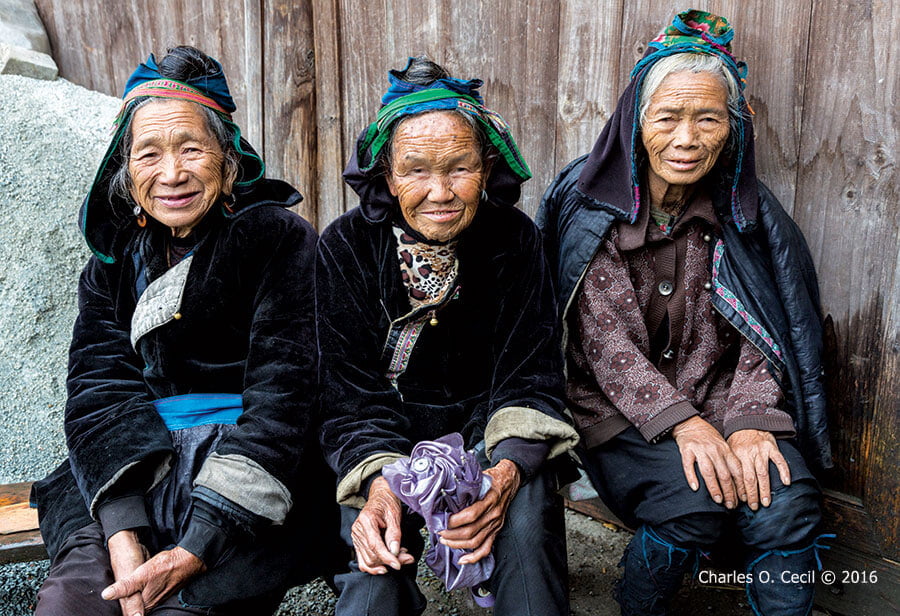China
People’s Republic of China Eastern Asia Area 3.7M mi2; 9.6M km2 Arable 11% Population 1.4B (378/mi²; 146/km²) Gov’t Communist party-led state Capital Beijing (21.5M) GCP/Capita$16,400 Unemployment 4% In Poverty 0.6% Infant Mortality7/1K live births (160th) Life expectancy 78 yrs Median Age 38 yrs Literacy 97% Languages Mandarin (official), Yue (Cantonese), Wu (Shanghainese), Minbei (Fuzhou), Minnan (Hokkien-Taiwanese), Xiang, Gan, Hakka dialects, and minority languages including Zhuang, Mongolian, Kyrgyz, Uyghur, Tibetan Religions Folk religion 22%, Buddhist 18%, Christian 5%, Muslim 2%, Hindu and Jewish < 0.1% each, other (includes Daoist) 0.7%, unaffiliated 52% Health 5% of GDP Education 4% of GDP (123rd) Military 2% of GDP (86th) Labor Force Agriculture 28%, industry 29%, services 43% PCVs 1993–2020 CURRENT: 0, TTD: 1,448 |  China An afternoon of casual conversation is a favorite pastime of elderly women in the Dong village of Huanggang, which lies nestled in the mountains of Guizhou Province in southwestern China. Because Huanggang is less accessible than other villages, it is less visited by foreign tourists and has preserved more of its traditional culture, including dress styles. The Dong minority is one of 55 minority ethnic groups officially recognized by the Chinese government. |
Adult Books

By Yu Hua. Translated by Allan Hepburn Barr
Genre: Nonfiction; essays; memoir
Publisher: Pantheon Books (2011)
ISBN-10: 0307739791
ISBN-13: 978-0307739797
Summary:
Esteemed novelist and essayist Yu Hua examines ten common two-character words--people (人民), leader (领袖), reading (阅读), writing (写作), Lu Xun (鲁迅), revolution(革命), disparity (差距), grassroots (草根), copycat (山寨), bamboozle (忽悠)--as guideposts for exploring personal memories from half a century of life in a fast modernizing and globalizing China that nonetheless remains grounded in age-old tradition. An acute observer of his country and countrymen, he also explains how those words illuminate some fundamental defining traits and trends in Chinese society and culture writ large.
"...an outstanding set of essays on the general topic of why modern China is the way it is... Very much worth reading." (James Fallows, The Atlantic)
"Yu Hua has a fiction writer's nose for the perfect detail, the everyday stuff that conveys more understanding than a thousand Op-Eds.... Perhaps the most bewitching aspect of this book is how funny it is....” (Laura Miller, Salon)
Kids' Books

By Wang Yage, illustrated by Zhu Chengliang, translated by Helen Wang
Format: Hardcover, 40 pp.; color illus
ISBN-10: 1542029848
ISBN-13: 978-1-54202-984-1
Age Range: 3–7 years
Publisher: Seattle, WA: Amazon Crossing Kids, 2022
Summary:
Zhao Di and her friends celebrate the Chinese New Year with their colorful lanterns each night for 15 days, after which they get to smash their lanterns! Details about this tradition are included in an end note.
REVIEWS:
“...This work will foster discussions of unique traditions and is a good addition to holiday collections. —School Library Journal
“A colorful wintry tale ushers in Chinese New Year over two weeks...In a pivotal spread that shows Zhao Di sitting with her dog and chickens, readers are granted an interior view of the architecture and layout of a rustic farmhouse. In addition, the villagers’ various clothing styles, headdresses, and skin tones suggest the region’s diverse ethnicities and socio-economic landscapes...A charming illustration of childhood memories during the holiday season.” ―Kirkus Reviews
“Quiet, elegant passages stud the text...Tenderly detailed gouache paintings by Zhu render the children as small, patterned bundles frolicking against expanses of snow...A quiet celebration of a Northwestern Chinese tradition.” ―Publishers Weekly
“Zhu’s illustrations feature Zhou Di and her friends bundled into soft, candy-colored shapes that glow as brightly as their lanterns against the silvery snow and chocolate night sky, while details of other New Year rituals and hints of rural village life background the girls’ activities. An author’s note expands briefly on setting and customs, making this an enticing addition to turn-of-the-year story times.” ―The Bulletin of the Center for Children’s Books
Films

Genre: Drama
Director: Zhang Yimo
Country: China
Release Date: 2018
Filming Locations: China
Language: Mandarin
Run Time: 116 minutes
Summary:
Set during China's Three Kingdoms era (AD 220-280, Shadow (Ying) is the story of a great king and his people, who will be expelled from their homeland and will aspire to claim it. The king, violent and ambitious, of mysterious methods and motives; his general, a visionary who yearns to win the final battle but needs to prepare his plans in secret; the women of the palace, who struggle to find redemption in a world where they have no place; and a commoner called "Lord of all the world", will be the characters around who turn the inexorable forces of this story.
About the film:
Shadow was celebrated by critics upon its release, with many praising its cinematography and set design. On the film review aggregator website Rotten Tomatoes, the film has an approval rating of 94% based on 103 reviews and an average rating of 7.6/10. The website's critical consensus reads, "Beautifully filmed and inventively choreographed, Shadow is a thrilling and visually sumptuous wuxia epic that finds director Zhang Yimou near peak form." On Metacritic, the film has an average score of 81 out of 100, based on 25 critics, indicating "universal acclaim".
Music
Recipes
Nepal Cultural Resources




